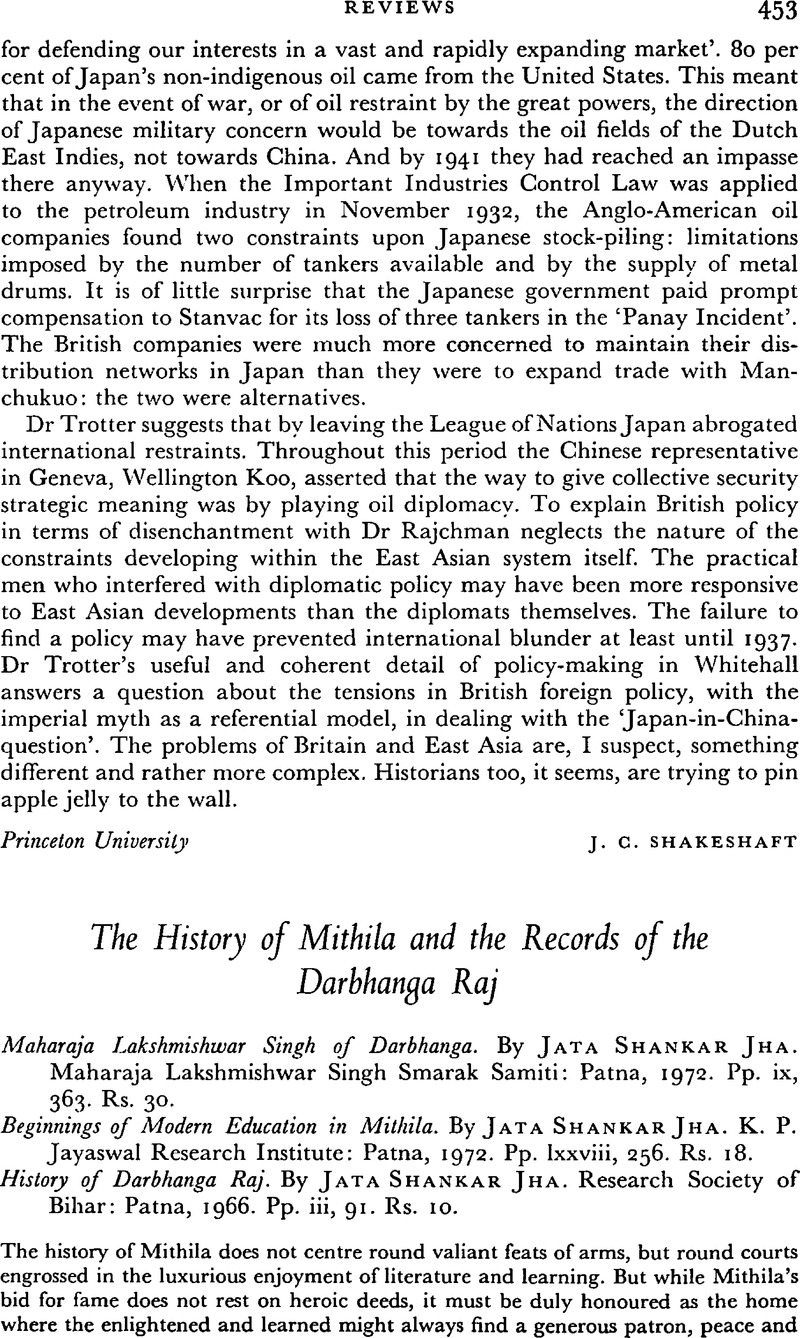No CrossRef data available.
Published online by Cambridge University Press: 28 November 2008

1 Stevenson-Moore, C. J., Muzaffarpur Settlement Report 1892–99 (Calcutta, 1901). The quotation tells us almost as much about the prejudices of Victorian civilians as about Mithila.Google Scholar
2 See Fisher's, C. M. study of their ‘containment’. ‘Planters and Peasants: The Ecological Context of Agrarian Unrest on the Indigo Plantations of North Bihar, 1820–1920’, in The Impact of Imperialism, ed. Dewey, C. J. and Hopkins, A. G., which the Athlone Press is due to publish for the Institute of Commonwealth Studies in 1976.Google Scholar
3 The administrative situation in Mithila is documented in great detail in the official records relating to the formulation and enforcement of the great Bengal Tenancy Act of 1885. The most important of these are contained in Extracts from Papers Relating to the Amendment of the Substantive Law of Rent in Bengal, 2 vols, Government of India (Calcutta, 1884), Bihar Rent Papers, India Office Records (74) 1908/3; and the Papers Relating to the Land Records Maintenance Act III (BC) of 1895, Government of Bengal (Calcutta, 1895).Google Scholar
4 Lakshmishwar Singh, as Dr Jha shows, was the great exception; but even Lakshmishwar was ‘radical’ at the national level, and conservative at home in Mithila. Forced to operate several levels simultaneously, the Khandvalas always found it difficult to prevent the posture appropriate at one stage spilling over into another. The present junior maharani, I am informed, lives a jet-set life in Delhi, but becomes more and more secluded as she approaches Darbhanga.
5 The failure of the Maithili separatist movement to mobilize sufficient popular support after independence is a graphic illustration of the constraints on the élite castes' political effectiveness due to their own exclusiveness; see Brass, P. R., Language, Religion and Politics in North India (Cambridge, 1974), pp. 51–118.Google Scholar
6 See Mishra's, A. K. splendidly informative History of Maithili Literature, 2 vols (Allahabad, 1949)Google Scholar; the ‘Introduction’ to Archer's, W. G. edition of the Love Songs of Vidyapati (London, 1963);Google ScholarGrierson's, E. A. early Introduction to the Maithili Language of Bihar, 2 pts (Calcutta, 1881–1882)Google Scholar; and Shyam, Narain Singh, History of Tirhut (Calcutta, 1922), especially appendices A, B and E.Google Scholar
7 O'Malley, L. S. S., Bengal District Gazetteers: Darbhanga (Calcutta, 1907), pp. 36ff.Google Scholar
8 Jha, Jata Shankar, ‘The Darbhanga Raj Records Office’, Proceedings of the Indian Historical Records Commission, XXXIV, 33–41;Google Scholar‘A Peep into the Darbhanga Raj Archives’, Indian Archives, XII (1958), 45–50;Google Scholar and ‘Some Rare and Unpublished Documents in the Darbhanga Raj Archives’, Journal of the Research Society of Bihar, Professor Syed Hosain Askari Felicitation Volume (1968), pp. 238–54. See also the annual Reports of the Bihar Regional Records Committee, edited by Datta, K. K..Google Scholar
9 It would be wrong to let this opportunity pass without some acknowledgement of my indebtedness to the executor of the Darbhanga estate, Pandit Lakshmi Kant Jha, for permission to work in the Raj archives, and my gratitude to the Raj officials—Shri Durganand Jha (assistant manager), Shri Harisch Chandra Jha (officer on special duty), and Mohammed Abdul Raziq (assistant record keeper)—who made my stay in Darbhanga in the autumn of 1974 so pleasant and productive. Shri Saran Singh (chief secretary to the Government of Bihar), Dr J. C. Kundra (commissioner, Darbhanga Division); Dr Madneshwar Mishra (Vice-Chancellor, University of Mithila), Professor Nurul Hassan (central minister of education), Dr V. C. Joshi (deputy director, Nehru Museum), the Director of the National Archives, and Professor Dharma Kumar (Delhi School of Economics) were all instrumental in ensuring the preservation of the archive; and deserve the thanks of Indian historians.